ALL RESOURCES
FILTER BY TAG
Select a tag
- Academic performance
- Accessibility
- Accountability
- Advocacy
- Advocates
- Article
- Bill analysis
- Bill tracker
- Billionaires
- Blog post
- Civil rights
- Coalition building
- Community Schools
- Cost impact analysis
- Dark Money
- Data
- Disability
- Discrimination
- Drain funds from public education
- Education Savings Account (ESA)
- English language learners
- Fact sheet
- Fraud Waste and Abuse
- Graphic
- History
- Indigenous and Native Education
- Integration
- LGBTQ+
- Legislation
- Letter
- Litigation
- Messaging or talking points
- Model legislation
- National Voucher
- News
- Parents
- Personal narrative
- Podcast
- Policy brief
- Policymakers
- Radio
- Referendum
- Religion
- Report
- Rural communities
- Segregation
- Separation of church and state
- Slide deck
- Slides
- State Constitutional Right to Education
FILTER BY AUTHOR
Select an author
- Aaron Sanderford
- Alec MacGillis
- Allen Pratt
- Associated Press
- Bob Peterson
- Bruce Schreiner
- Catherine Caruso
- David Montgomery
- David Pepper
- Eli Hager
- Emily Walkenhorst
- Ethan Dewitt
- Geoff Mulvihill
- Hilary Wething
- Howard Fischer
- Jason Bailey
- Jessica Corbett
- Jim Collier
- Joe Dana
- Joshua Cowen
- Juan Perez Jr.
- Kiera Butler
- Laura Pappano
- Liam Amick
- Maurice Cunnningham
- Nora De La Cour
- Paige Masten
- Patrick Darrington
- Paul Hammel
- Phil Williams
- Rob Boston
- Robert Huber
- Rowan Moore Geretsy
- Sasha Pudelski

Letter to IRS on Section 1001 Regulation in 2023-2024 Priority Guidance Plan
The National Education Association and partners wrote a letter urging that the IRS return to the work it left unfinished in 2019 when it issued final regulations on “Contributions in Exchange for State or Local Tax Credits” (RIN: 1545-BO89). Specifically, they suggest that the IRS issue a regulation clarifying the following:
A contribution of property in exchange for a 100 percent tax credit should be treated as equivalent to a sale at market value (“other disposition of property” under IRC section 1001) and the taxpayer should either owe tax on the portion of that sale that represents a gain, or recognize a loss if appropriate. When the contribution is made in exchange for a tax credit worth less than 100 percent of the amount donated, the transaction should be treated as part gift and part sale.
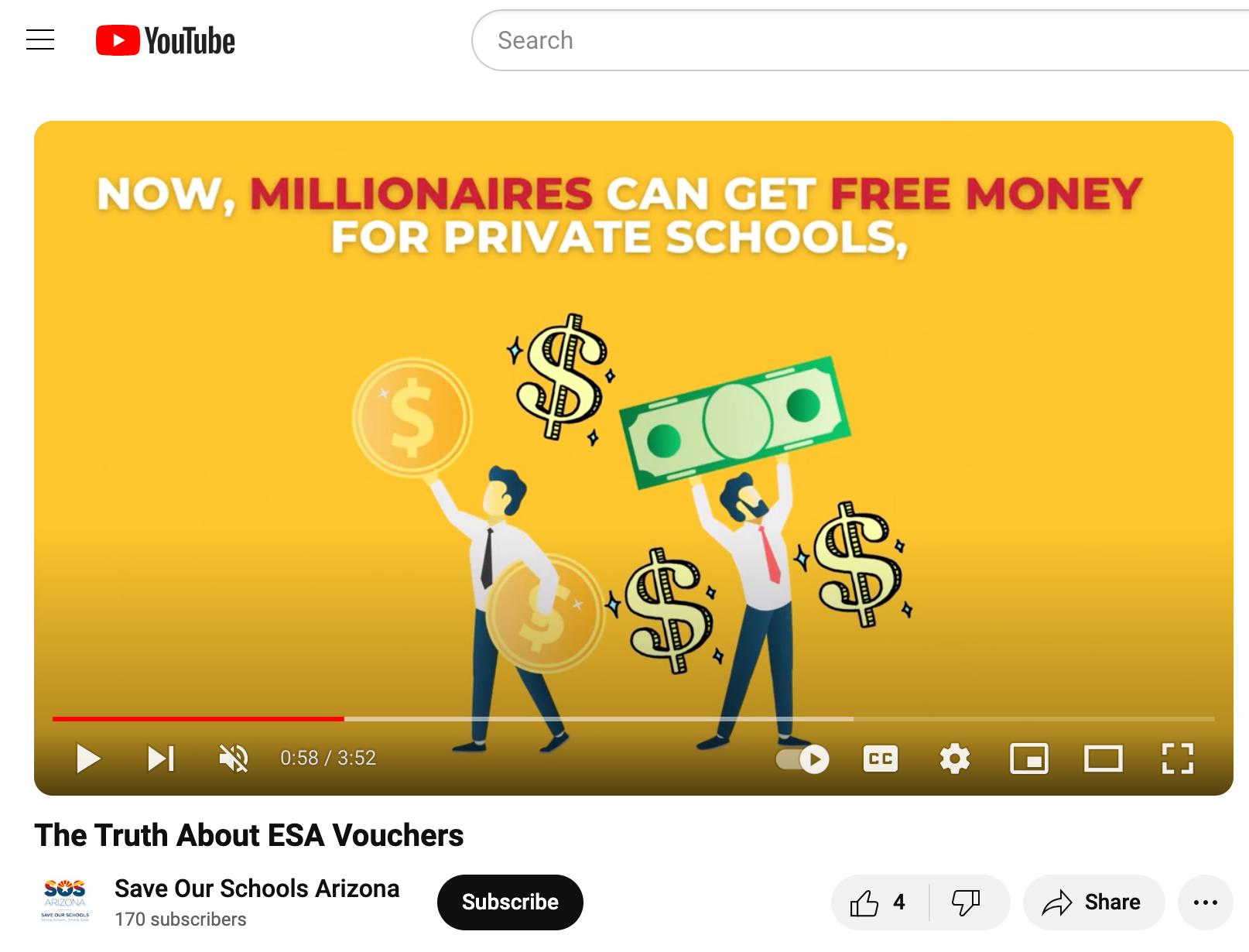
The Truth About ESA Vouchers
In this video Save Our Schools Arizona outlines the truth about the Empowerment Scholarship Account voucher program.
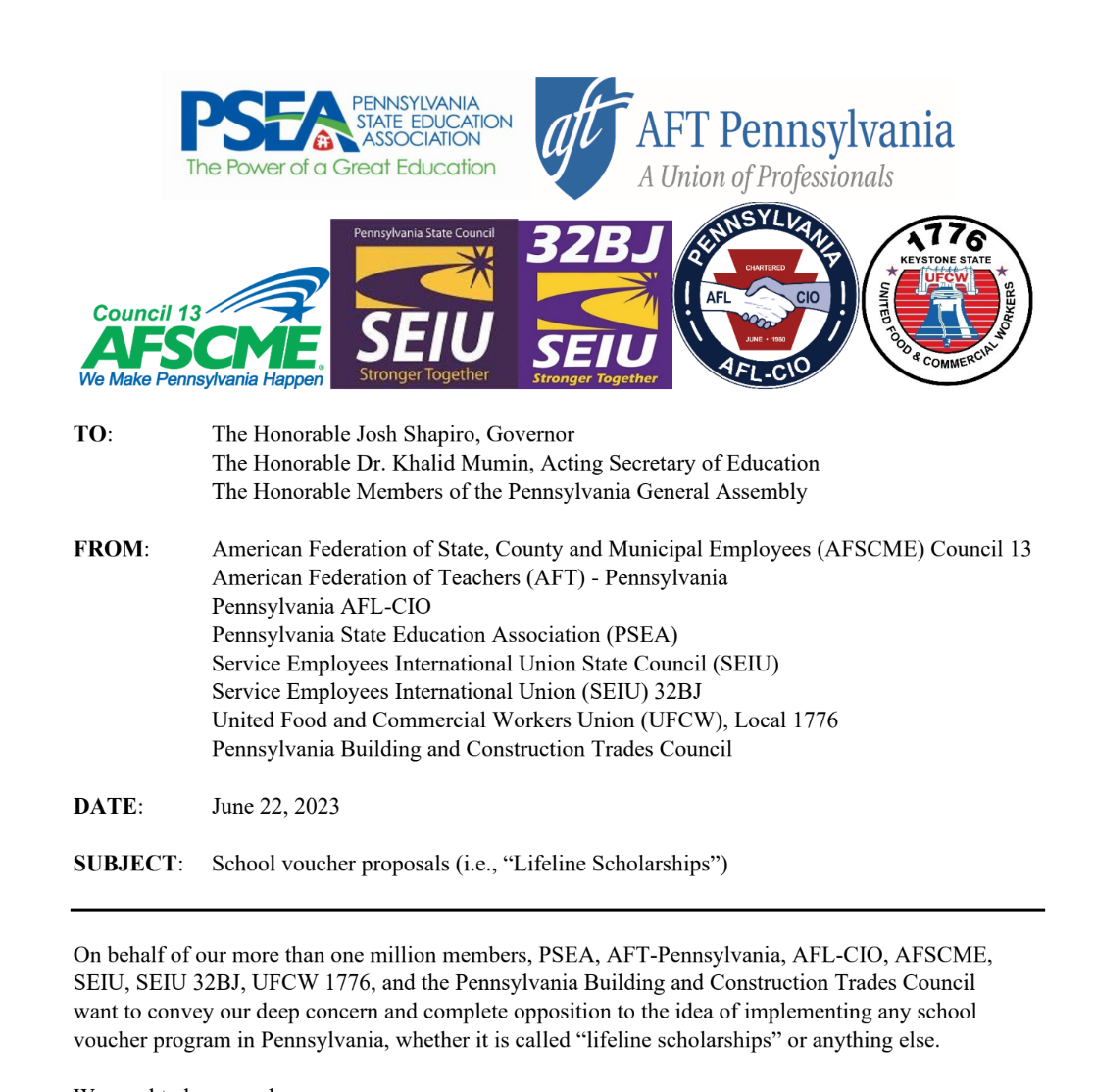
Joint Letter re “Lifeline Scholarship” Proposal
The Education Law Center-PA, PSEA, AFT-Pennsylvania, AFL-CIO, AFSCME, SEIU, SEIU 32BJ, UFCW 1776, and the Pennsylvania Building and Construction Trades Council on behalf of their members wrote a letter to the Shapiro administration conveying deep concern and complete opposition to the idea of implementing any school voucher program in Pennsylvania, whether it is called “lifeline scholarships” or anything else

Report to the Shapiro/Davis Team on Education in the Commonwealth
Education Voters of Pennsylvania developed this section on Pennsylvania’s EITC/OSTC school voucher programs with support from the PA Schools Work Campaign. The Educational Improvement Tax Credit (EITC) and Opportunity Scholarship Tax Credit (OSTC) voucher programs work by reducing taxes paid by businesses to the state when they contribute to scholarship organizations that provide vouchers for children to attend a private or religious school. The programs are administered by the Pennsylvania Department of Community and Economic Development (DCED).

PA’s EITC and OSTC Training Module
Education Voters of Pennsylvania developed a series of modules on school funding topics for advocates. The Educational Improvement Tax Credit (EITC) and the Opportunity Scholarship Tax Credit (OSTC) module includes a video, handouts, activities and a mini quiz to check for understanding and certify your completion of the course. Most should take less than ½ hour to complete and you can work at your own pace.
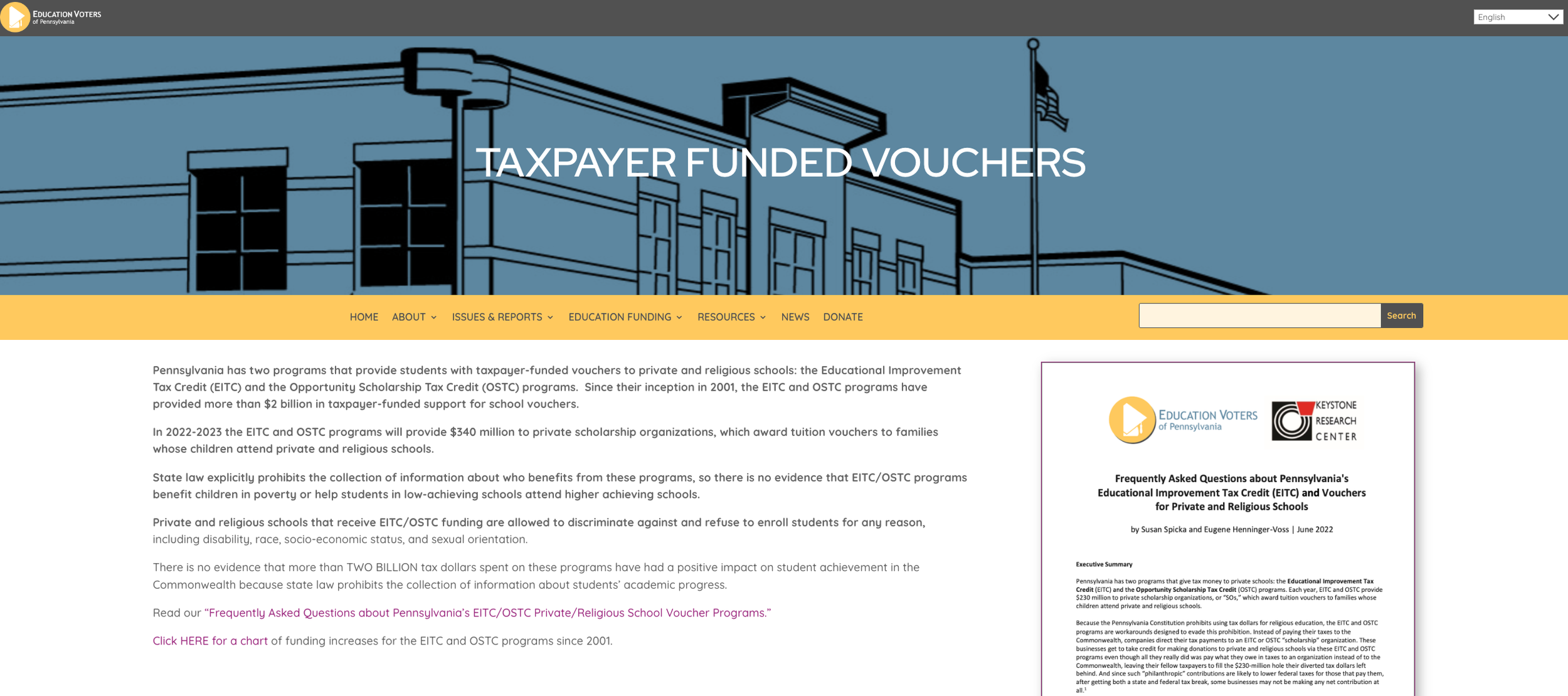
Taxpayer Funded Vouchers
Pennsylvania has two programs that provide students with taxpayer-funded vouchers to private and religious schools: the Educational Improvement Tax Credit (EITC) and the Opportunity Scholarship Tax Credit (OSTC) programs. Since their inception in 2001, the EITC and OSTC programs have provided more than $2 billion in taxpayer-funded support for school vouchers.
In 2022-2023 the EITC and OSTC programs will provide $340 million to private scholarship organizations, which award tuition vouchers to families whose children attend private and religious schools.

PA EITC and OSTC School Voucher Programs
The Educational Improvement Tax Credit (EITC) and Opportunity Scholarship Tax Credit (OSTC) voucher programs work by reducing taxes paid by businesses to the state when they contribute to scholarship organizations that provide vouchers for children to attend a private or religious school. The programs are administered by the Pennsylvania Department of Community and Economic Development (DCED).

FAQs About Pennsylvania’s EITC and Vouchers for Private and Religious Schools
Pennsylvania has two programs that give tax money to private schools: the Educational Improvement Tax Credit (EITC) and the Opportunity Scholarship Tax Credit (OSTC) programs. Each year, EITC and OSTC provide $230 million to private scholarship organizations, or “SOs,” which award tuition vouchers to families whose children attend private and religious schools. Because the Pennsylvania Constitution prohibits using tax dollars for religious education, the EITC and OSTC programs are workarounds designed to evade this prohibition. Instead of paying their taxes to the Commonwealth, companies direct their tax payments to an EITC or OSTC “scholarship” organization.
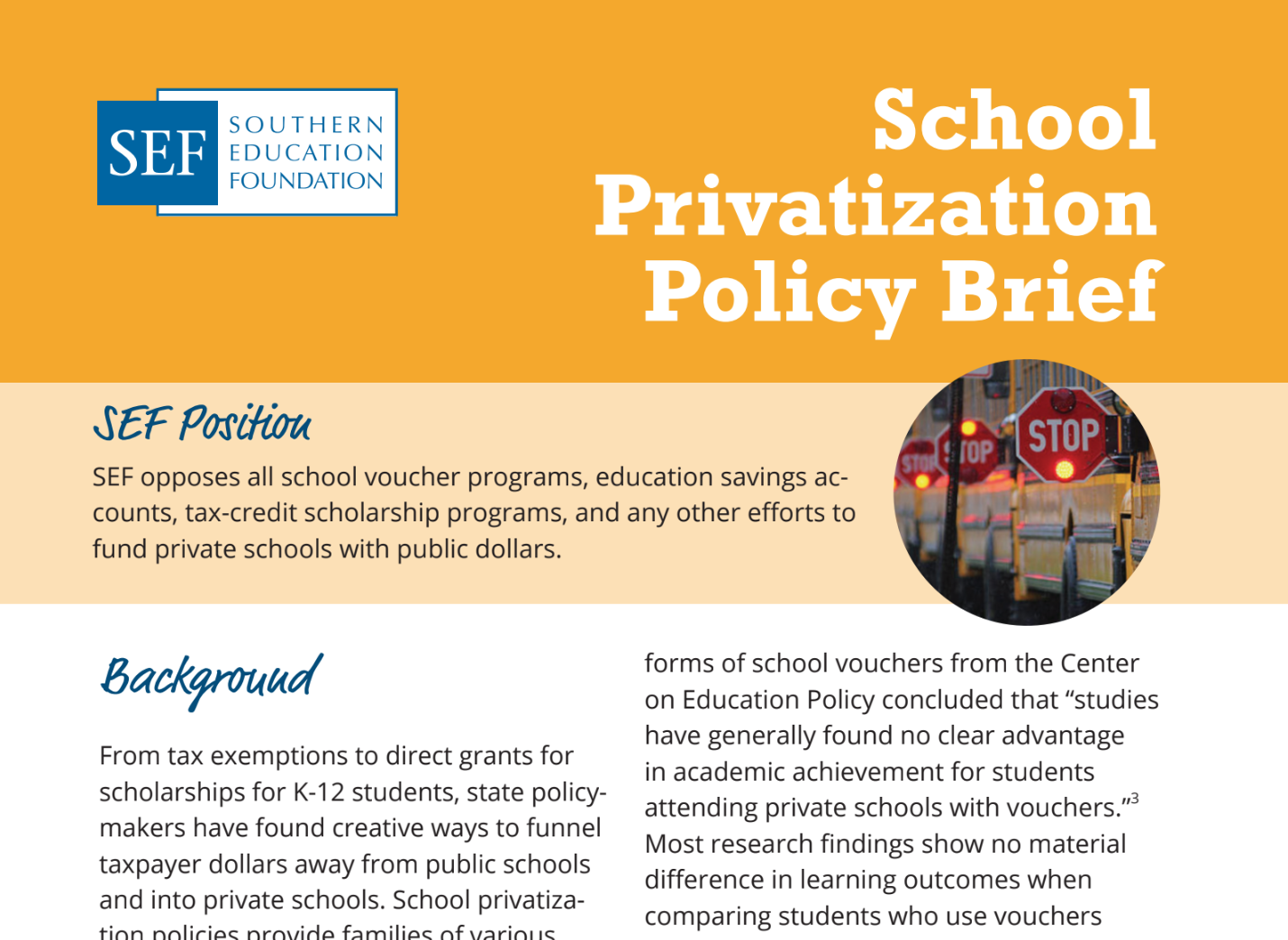
School Privatization Policy Brief
The Southern Education Foundation developed this policy brief SEF in opposition to all school voucher programs, education savings accounts, tax credit scholarship programs, and any other efforts to fund private schools with public dollars. In the seventeen states SEF serves, twelve states operate school privatization programs that provide either school vouchers, tax-credit scholarships, or education savings accounts, resulting in 276,000 participating students and amounting to $1.6 billion in state funding or tax benefits to fund private schools or pay for private education services.

Pennsylvania Voucher Schools Use Tax Dollars to Advance Discrimination
Education Voters of Pennsylvania developed this report on the $340 million in annual funding for EITC and OSTC programs that provide taxpayer-supported vouchers to students who attend private and religious schools.
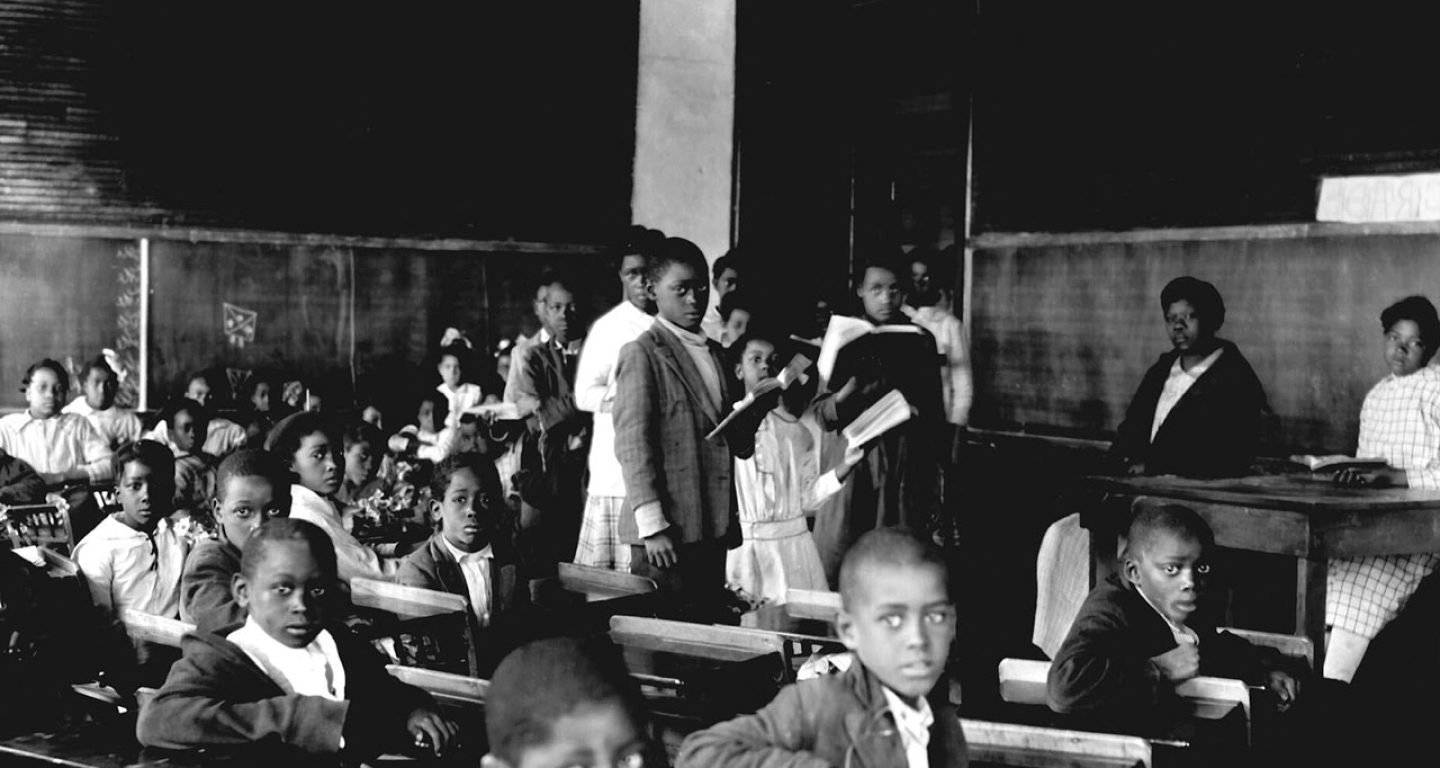
A History of Private Schools and Race in the American South
Private schools in the South were established, expanded, and supported to preserve the Southern tradition of racial segregation in the face of the federal courts’ dismantling of “separate but equal.” White students left public schools in droves to both traditional and newly formed private schools. From 1950 to 1965, private school enrollment grew at unprecedented rates all over the nation, with the South having the largest growth.

Vouchers Impede Efforts to Create Diverse School Communities and Harm Academic Outcomes
Illinois Families for Public Schools developed these talking points in English and Spanish on how the Invest in Kids voucher program hurts equity.

Letter re SB 795 Private School Vouchers
The Education Law Center-PA wrote this letter urging the senate to reject SB 795. Funding private schools with public dollars, as this bill proposes, will not move the Commonwealth a single dollar closer to its constitutional mandate, which is to support and maintain a contemporary, effective public education system accessible to every child in the Commonwealth, regardless of their school district’s local wealth. In fact, it does the opposite, redirecting funds away from public schools and making compliance with the court ruling harder to achieve.
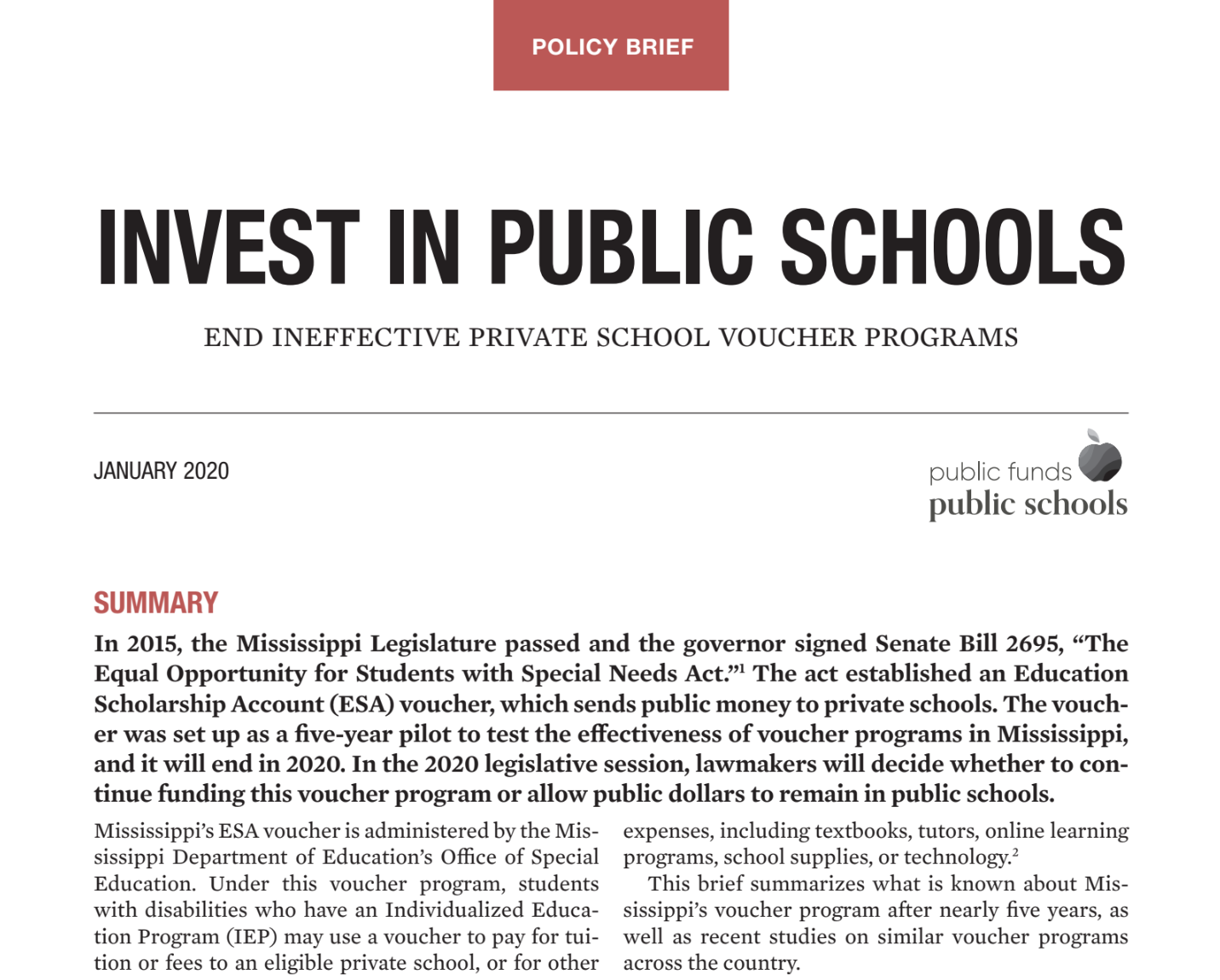
Invest in Public Schools
This policy brief focuses on Mississippi’s ESA voucher program. In 2015, the Mississippi Legislature passed and the governor signed Senate Bill 2695, “The Equal Opportunity for Students with Special Needs Act.”1 The act established an Education Scholarship Account (ESA) voucher, which sends public money to private schools. The voucher was set up as a five-year pilot to test the effectiveness of voucher programs in Mississippi, and it will end in 2020. In the 2020 legislative session, lawmakers will decide whether to continue funding this voucher program or allow public dollars to remain in public schools.

Something to Lose: How School Voucher Programs Fail to Provide Civil Rights and Constitutional Protections
This webinar features Dr. Preston Green, Professor of Educational Leadership and Law at the University of Connecticut and the John and Maria Neag Professor of Urban Education at the Neag School. Dr. Green has extensive knowledge of education law and has published numerous articles and book chapters on legal and policy issues related to educational access and school privatization. Dr. Green discusses school voucher programs and how these programs fail to provide civil rights and constitutional protections to students. He also discusses protections for students participating in voucher programs.

Overturning Brown: The Segregationist Legacy of the Modern School Choice Movement
This PFPS webinar features Steve Suitts in a discussion about his must-read new book, “Overturning Brown: The Segregationist Legacy of the Modern School Choice Movement,” with Dr. Sybil Jordan Hampton, to whom Suitts dedicates the book in honor of her lifelong efforts to advance equality for school children.
In Overturning Brown, Suitts examines the parallels between southern segregationist practices and the modern school choice movement, exposing the fallacy behind the latter’s so-called civil rights agenda. The book also highlights the risks facing America’s underserved youth as expanding school voucher programs divert public funds to predominantly white, often wealthy private schools.

Preferencing Educational Choice: The Constitutional Limits
Rapidly expanding charter and voucher programs are establishing a new education paradigm in which access to traditional public schools is no longer guaranteed. In some areas, charter and voucher programs are on a trajectory to phase out traditional public schools altogether. This Article argues that this trend and its effects violate the constitutional right to public education embedded in all fifty state constitutions.
